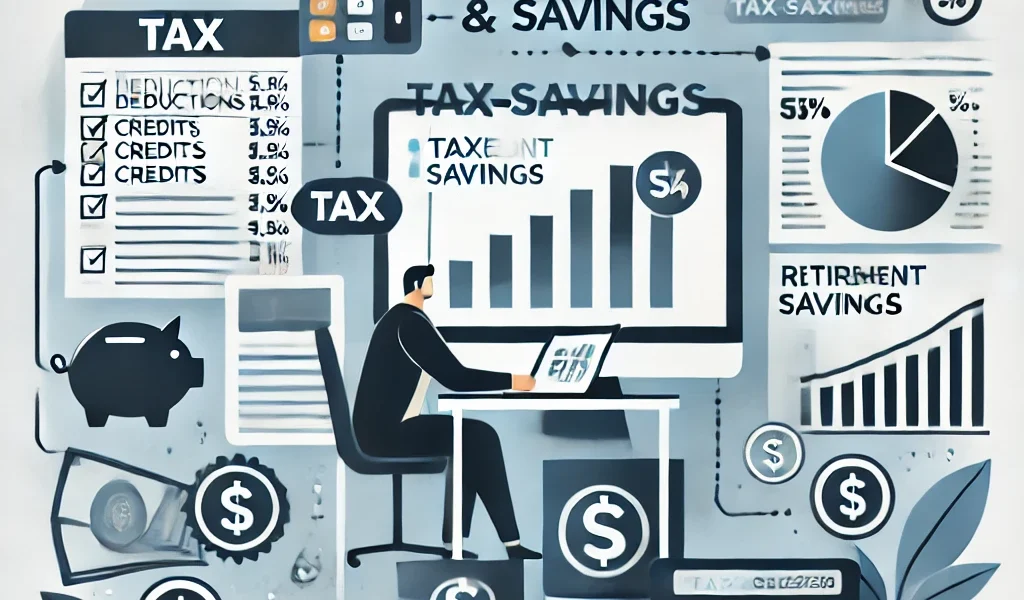1. Understand Your Tax Bracket
Your tax rate depends on your income level and filing status.
📊 Steps to Identify Your Tax Bracket:
✔ Check the latest income tax slabs for your country.
✔ Understand how progressive tax rates work (higher income = higher tax rate).
✔ Estimate your annual taxable income after deductions.
🔹 Pro Tip: If you’re close to moving into a higher tax bracket, consider investing in tax-saving options to reduce taxable income.
2. Maximize Tax Deductions
Tax deductions lower your taxable income, reducing the amount of tax you owe.
✅ Common Tax Deductions:
✔ Retirement Contributions: 401(k), IRA, or other pension plans.
✔ Health Expenses: Medical bills, health insurance premiums (if deductible).
✔ Education Costs: Tuition fees, student loan interest.
✔ Home Mortgage Interest: Deductible in many countries.
✔ Charitable Donations: Contributions to registered charities.
✔ Work-Related Expenses: Business travel, home office costs (for self-employed).
🔹 Pro Tip: Keep all receipts and records to claim deductions easily.
3. Take Advantage of Tax Credits
Unlike deductions, tax credits reduce your actual tax bill directly.
🎯 Popular Tax Credits:
✔ Earned Income Tax Credit (EITC): For low-to-moderate income earners.
✔ Child Tax Credit: For parents supporting children under a certain age.
✔ Education Tax Credits: For students or parents paying for college.
✔ Energy Efficiency Credits: If you install solar panels or energy-efficient home upgrades.
🔹 Pro Tip: Credits provide more savings than deductions because they lower the tax you owe dollar-for-dollar.
4. Contribute to Tax-Advantaged Accounts
Investing in tax-advantaged accounts reduces taxable income and grows your savings.
💰 Best Tax-Advantaged Accounts:
✔ Retirement Accounts: 401(k), IRA, Roth IRA, or government pension schemes.
✔ Health Savings Account (HSA): Tax-free savings for medical expenses.
✔ Education Savings Plan (529 Plan): Tax-free growth for future education costs.
🔹 Pro Tip: Contribute as much as possible to these accounts to maximize tax benefits.
5. Use Smart Investment Strategies
Taxes on investments can eat into your profits, so plan wisely.
📈 Tax-Efficient Investing Tips:
✔ Hold investments long-term to qualify for lower capital gains tax.
✔ Invest in municipal bonds (tax-free income).
✔ Use tax-loss harvesting – sell underperforming stocks to offset capital gains.
✔ Choose index funds or ETFs (lower tax burden than actively managed funds).
🔹 Pro Tip: Diversify investments across taxable and tax-deferred accounts for better savings.
6. Optimize Business and Self-Employment Taxes
If you run a business or work as a freelancer, you have additional tax-saving opportunities.
🚀 Tax Strategies for Business Owners & Freelancers:
✔ Deduct business expenses (equipment, marketing, travel, home office).
✔ Hire family members and pay them a salary (tax-efficient income shifting).
✔ Depreciate assets like vehicles and office equipment.
✔ Incorporate your business to benefit from lower corporate tax rates.
🔹 Pro Tip: Consult a tax professional to structure your business in a tax-friendly way.
7. Plan for Retirement Early
Saving for retirement not only secures your future but also lowers your tax liability.
📉 Ways to Reduce Taxes with Retirement Planning:
✔ Contribute the maximum limit to 401(k) or IRA accounts.
✔ Consider a Roth IRA for tax-free withdrawals in retirement.
✔ If self-employed, use a SEP IRA or Solo 401(k) for higher contributions.
🔹 Pro Tip: Start early to benefit from tax-free compounding growth over time.
8. Defer Income to Reduce Taxable Income
If you expect your income to be lower next year, postpone some earnings to a future tax year.
🔄 How to Defer Income:
✔ Delay year-end bonuses if it pushes you into a higher tax bracket.
✔ Invoice clients in January instead of December (for self-employed).
✔ Shift income into tax-advantaged retirement accounts.
🔹 Pro Tip: Defer income only if your future tax rate will be lower.
9. Keep Accurate Tax Records
Good record-keeping helps you claim deductions, avoid audits, and file taxes smoothly.
📂 Tax Record-Keeping Tips:
✔ Store receipts for at least 3–7 years.
✔ Use tax software like TurboTax, QuickBooks, or Xero.
✔ Keep digital copies of invoices, bills, and donation receipts.
🔹 Pro Tip: Organizing records throughout the year prevents last-minute tax filing stress!
10. Consult a Tax Professional
A tax expert or CPA can help identify hidden tax-saving opportunities and keep you compliant with tax laws.
🎯 When to Hire a Tax Expert:
✔ If you own a business or multiple investments.
✔ If you’re dealing with international taxes.
✔ If you’ve had a major life change (marriage, inheritance, etc.).
🔹 Pro Tip: The money spent on a tax professional often pays for itself in tax savings!
Final Thoughts: Start Your Tax Planning Today!
🚀 Tax planning is an essential part of financial success. The earlier you start, the more you can legally save!



